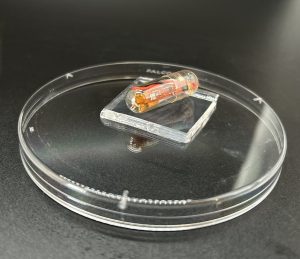When Binbin Ying’s family member was diagnosed with late-stage colorectal cancer, he knew he wanted to find a way to help future patients, and asked himself, “what can I do as a researcher and scientist to help monitor gastrointestinal (GI) diseases so they can be managed at an earlier stage?”

He answered this question by researching the development of next-generation ingestible robots. These robots, when swallowed, can stay in the digestive tract to support continuous monitoring and the long-term intervention of chronic and life-threatening GI diseases, such as colorectal cancer, gastroparesis and inflammatory bowel disease.
Once approved for clinical use, Ying’s research has the potential for wide-spread impact by reducing both patient risk and the high cost of continuous monitoring, which is currently achieved through endoscopies or x-ray imaging. Unlike existing methods, e-GLUE, a novel electroadhesive hydrogel that Ying is developing, would interact directly with tissue—providing a non-invasive solution for the early and long-term management of GI diseases.
This groundbreaking research led Ying to receive a prestigious 2023 Banting Postdoctoral Fellowship. The Fellowship is awarded to only 70 postdoctoral researchers each year to fund promising researchers in Canada and abroad who will positively contribute to the country’s economic, social and research-based growth.
Ying is currently a postdoctoral fellow working with professors Giovanni Traverso and Robert Langer at the Massachusetts Institute of Technology jointly appointed to the Brigham and Women’s Hospital at Harvard Medical School. Ying joined the Robotics Institute in 2018 as a visiting PhD student and research fellow working with Professor Xinyu Liu to develop a novel artificial ionic skin to open new avenues for next-generation, skin-inspired wearable electronics.
